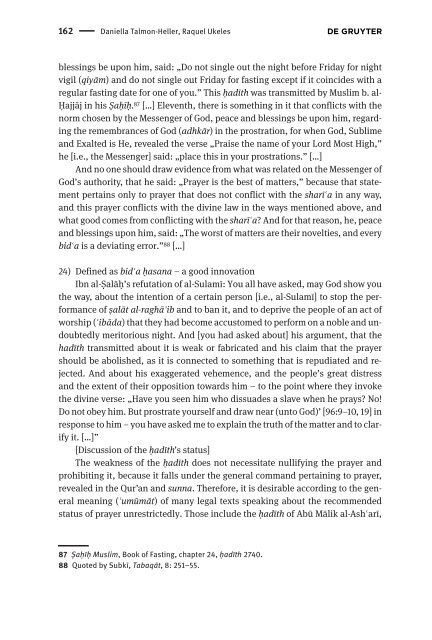0021-1818_islam_98-1-2-i-259
0021-1818_islam_98-1-2-i-259
0021-1818_islam_98-1-2-i-259
Create successful ePaper yourself
Turn your PDF publications into a flip-book with our unique Google optimized e-Paper software.
162 Daniella Talmon-Heller, Raquel Ukeles<br />
blessings be upon him, said: „Do not single out the night before Friday for night<br />
vigil (qiyam) and do not single out Friday for fasting except if it coincides with a<br />
regular fasting date for one of you.” This hadith was transmitted by Muslim b. al-<br />
0ajjaj in his Sahih. 87 […] Eleventh, there is something in it that conflicts with the<br />
norm chosen by the Messenger of God, peace and blessings be upon him, regarding<br />
the remembrances of God (adhkar) in the prostration, for when God, Sublime<br />
and Exalted is He, revealed the verse „Praise the name of your Lord Most High,”<br />
he [i.e., the Messenger] said: „place this in your prostrations.” […]<br />
And no one should draw evidence from what was related on the Messenger of<br />
God’s authority, that he said: „Prayer is the best of matters,” because that statement<br />
pertains only to prayer that does not conflict with the shari^a in any way,<br />
and this prayer conflicts with the divine law in the ways mentioned above, and<br />
what good comes from conflicting with the shari^a? And for that reason, he, peace<br />
and blessings upon him, said: „The worst of matters are their novelties, and every<br />
bid^a is a deviating error.” 88 […]<br />
24) Defined as bid^a hasana – a good innovation<br />
Ibn al-Sala1’s refutation of al-Sulam\: You all have asked, may God show you<br />
the way, about the intention of a certain person [i.e., al-Sulam\] to stop the performance<br />
of salat al-ragha#ib and to ban it, and to deprive the people of an act of<br />
worship (^ibada) that they had become accustomed to perform on a noble and undoubtedly<br />
meritorious night. And [you had asked about] his argument, that the<br />
hadith transmitted about it is weak or fabricated and his claim that the prayer<br />
should be abolished, as it is connected to something that is repudiated and rejected.<br />
And about his exaggerated vehemence, and the people’s great distress<br />
and the extent of their opposition towards him – to the point where they invoke<br />
the divine verse: „Have you seen him who dissuades a slave when he prays? No!<br />
Do not obey him. But prostrate yourself and draw near (unto God)’ [96:9–10, 19] in<br />
response to him – you have asked me to explain the truth of the matter and to clarify<br />
it. […]”<br />
[Discussion of the hadith’s status]<br />
The weakness of the hadith does not necessitate nullifying the prayer and<br />
prohibiting it, because it falls under the general command pertaining to prayer,<br />
revealed in the Qur’an and sunna. Therefore, it is desirable according to the general<br />
meaning (^umumat) of many legal texts speaking about the recommended<br />
status of prayer unrestrictedly. Those include the hadith of Abu Malik al-Ash^ar\,<br />
87 Sahih Muslim, Book of Fasting, chapter 24, hadith 2740.<br />
88 Quoted by Subk\, Tabaqat, 8: 251–55.


